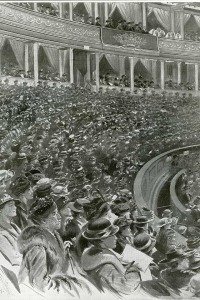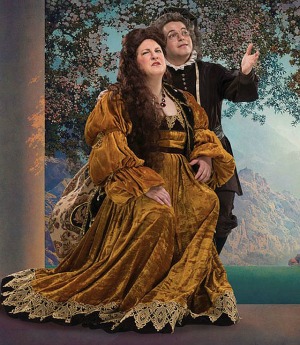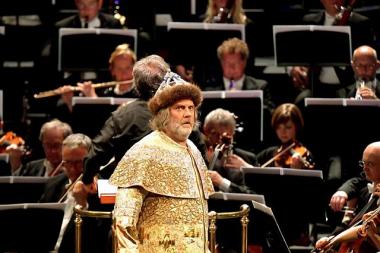BBC Proms — Biggest and Best Summer Music Festival — Is Yours Free

Every day through early September, at 11 or 11:30 a.m. Pacific Time (depending on the length of the concert), you can go to BBC-3 on the computer, tablet or smartphone, and hear exceptional live concerts streamed from Royal Albert Hall in London.

The BBC Proms is in progress, for the 121st year, and it’s not to be missed ... but if you do, programs remain on the BBC-3 website for a month.
And so, as an example, last week’s Boris Godunov, conducted by Antonio Pappano and with Bryn Terfel in the title role, is available as recorded. But if you want to share in the excitement of live concerts, here are a few upcoming gems:
- On July 23 (11:30 a.m. PDT), an unusual combination of the final scene from Wagner’s Die Walküre and Michael Tippett's A Child of Our Time, with soprano Tamara Wilson, mezzo Pamela Helen Stephen, tenor Peter Hoare, and bass James Creswell; Mark Wigglesworth conducts the National Orchestra and National Chorus of Wales.
- Vladimir Jurowski conducts the London Philharmonic on July 24 (noon, PDT) in a program of Beethoven’s Ninth Symphony and Two Episodes by Magnus Lindberg. Soloists include soprano Miah Persson, mezzo Anna Stéphany, tenor John Daszak, and bass Christopher Purves.
- Rossini’s The Barber of Seville is heard in a semi-staged performance on July 25 (11 a.m. PDT), with Danielle de Niese and Taylor Stayton as Rosina and Almaviva, Björn Bürger as Figaro; Enrique Mazzola conducts the London Philharmonic.
- Bernard Haitink conducts the London Symphony Orchestra on July 29 (11 a.m. PDT) in a performance of Mahler's Symphony No 3, with mezzo Sarah Connolly.
- Berlioz’s Romeo and Juliet is performed on July 30 (11:30 a.m. PDT) with mezzo Julie Boulianne and tenor Jean-Paul Fouchécourt; John Eliot Gardiner conducts the Monteverdi Choir, the National Youth Choir of Scotland, and Orchestre Révolutionnaire et Romantique.
SFO Percussionist “Tells All” in Book and on Fresh Air

“One time you practiced in a stairwell for so long that you hallucinated seeing flies on your drum pad,” Patricia Niemi was reminded last week in an NPR Fresh Air interview, “and you were actually happy about that because it meant that you'd really put your time in?”
“I felt pretty good about it,” replied the San Francisco Opera percussionist. “I thought, ‘wow, this is – I’m practicing a lot.’ So in my own little, perverse world, I thought that was great."
The interview, and Niemi’s recently published autobiography, Sticking It Out: From Juilliard to the Orchestra Pit, a Percussionist's Memoir, provide amusing and instructive insight into the life and work of an orchestra musician who is “different.” The introduction to the book traces her career from its beginning:
When Patti Niemi was 10 years old, all the children in her school music class lined up to choose their instruments. Boy after boy chose drums, and girl after girl chose flute – that is, until it was Patti’s turn. From that point onward, Niemi devoted her life to mastering the percussive arts. Cymbals, snare drum, marimba, timpani, chimes: she practised them all, and in 1983, she entered Juilliard, the most prestigious music conservatory in the world. …
Niemi’s memoir brings us inside a world that most of us never get to see: grueling practice schedules, intimate musical relationships, and long moments at the back of an orchestra spent sweating and counting before a big cymbal crash.
From Juilliard, Niemi’s career took her to Michael Tilson Thomas’ New World Orchestra, and in 1992, she joined the San Francisco Opera Orchestra, continuing her chamber-music and recording activites as well. She has recorded Christopher Rouse’s percussion works Ku-Ka-Ilimoku and Ogoun Badagris on a CD with the Concordia Orchestra and conductor Marin Alsop. More recently, she recorded chamber music by composer Howard Hersh, including the premiere of Night, for Clarinet and Marimba with SFO colleague Jose Gonzalez Granero.
City of Angels Opens at S.F. Playhouse

Spoofing film noir is easy; doing it well is a big challenge. The Cy Coleman-David Zippel City of Angels, now running at S.F. Playhouse through Sept. 17, meets the challenge in an ambitious production, with a fine cast, and company co-founder Bill English’s smooth direction. The 1989 musical won the Tony Award for Best Musical in 1990, along with several production and acting awards.
While no takeoff on film noir can approach the brilliance and depth of Dennis Potter’s The Singing Detective – hilarious and yet with all the suspense and excitement of the genre it mocks – City of Angels remains a spoof only, but an eminently entertaining, fun evening in the theater.
Just as in Potter’s work, City of Angels (with book by Larry Gelbart) has the writer (Stine, played by Jeffrey Brian Adams) sitting at a typewriter, creating the film – at times, “rewinding,” erasing, correcting it. Set in Los Angeles in the 1940s, the writer interacts with his central character, Stone, a private detective (the muscular Brandon Dahlquist, getting beaten to a pulp – not fiction – often) and the imperious studio boss, played with relish by Ryan Drummond.
On English’s spectacular, split-level stage design (the often-used bed slides in and out from beneath the structure), Stine even has episodes of carnal knowledge with ladies of the studio and of the detective story while his long-suffering wife (Caitlin Taylor) is away. Stine’s affair with Donna/Oolie (Monique Hafen) results in enough trouble to provide stories for several future scripts.
Dave Dobrusky leads a band accompanying the cast in such numbers as “You Can Always Count on Me,” “Tennis Song,” “Stay with Me,” and “I’m Nothing Without You.”
Classical Musicians on the Walk of Fame

What do Michael Jackson, Walt Disney, Mickey Mouse, and Donald Trump have in common? They all have stars on Hollywood's Walk of Fame, along with Marian Anderson, Leonard Bernstein, Maria Callas, and Enrico Caruso.
This is Hollywood, so most of the musical honorees are from the world of movies, rock, pop, and folk, but as the recent induction of Los Angeles Philharmonic Music Director Gustavo Dudamel proves, classical music is also represented. In fact, writes Jay Gabler on Minnesota's ClassicalMPR website:
The list of musicians who were inducted in 1960 as the Walk laid its first rows of stars reflects a great desire by the Hollywood Chamber of Commerce to honor the performers who brought classical music to radio and television when those media first launched. If you sang under the baton of Toscanini on NBC, for example, with any frequency, you probably got a star.
On the list compiled by Gabler – “showing how the Hollywood-based entertainment industries looked to classical music to lend their work legitimacy – are Licia Albanese, Robert Casadesus, Feodor Chaliapin, Plácido Domingo, Arthur Fiedler, Kirsten Flagstad, Morton Gould, Vladimir Horowitz, Zubin Mehta, Yehudi Menuhin, Ezio Pinza, Arthur Rubenstein, Beverly Sills, and many more.
In Brief: The Mikado in Renaissance Italy; Mandolin Concerto for Instagram

The Mikado in Renaissance Italy
Since Lamplighters Musical Theater came into existence in 1952, the Gilbert & Sullivan company has produced The Mikado 21 times, so music director Baker Peeples and stage director Ellen Brooks are now doing something “different.”
Not quite a EuroTrash approach, in performances between Aug. 5 and 28 in four Bay Area venues Ko-Ko, Pooh-Bah, Pish-Tush, et.al. will abandon Japan and move to … ready? … Renaissance Italy, with “a minimal number of necessary edits made to the names and dialogue.” Remember, seeing is believing:
“And you are right.
And we are right,
And all is right, is right as right can be!
And all is right as right can be!
Right as right can be!”

Mandolin Virtuoso Tours with His InstaConcerto
Mandolinist Avi Avital, accompanied by Kremerata Baltica, is touring with Concerto for Instagram, composed by Peter Breiner. The five movements are 15 seconds long each, the challenge being “to see whether a concerto could retain its essential identity within the context of a time-restrictive social media platform.”
The tour begins in Bad Kissingen, Germany, on July 19, and ends in the Hollywood Bowl on Sept. 15. Each concert will have a full program in addition to the concerto, some with chamber-music groups, others with an orchestra, such as the Aug. 13 event in Canada, Kent Nagano conducting Orchestre Symphonique de Montréal, the program including Vivaldi and Bach concerti.

